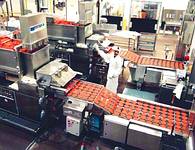

There are few people in the world that do not know McDonald’s, or recognise the famous Golden Arches. The success of the McDonald’s corporation is founded not only on its marketing, but also on the consistent quality of its hamburgers.
Have you ever wondered why McDonald's hot, fresh products taste the same everywhere in the world? It is McDonald's unique purchasing system and the relationship McDonald's shares with its dedicated suppliers that ensure the quality of products in every restaurant.
At McDonald's they have a saying, 'One Taste Worldwide', which is only possible because McDonald's sets strict requirements, which are the foundation of the production standards for the entire McDonald's supply chain. Consistency of product quality is one of the top priorities for McDonald's and they are on the leading edge of research and development in order to set new standards in quality. In addition because the McDonald's delivery program is so highly developed, they can trace any individual beef pattie back to the supplier's specific batch.
To become one of the suppliers to McDonald's restaurants, a company has to supply proof of its high operation standards. Cleanliness, consistency and traceability are three key factors that a supplier is judged on. Located in Linkoping, Sweden, Farlo was founded 10 years ago for the sole purpose of making McDonald's hamburgers. Farlo produces roughly one million hamburgers per day exclusively for McDonald's in both Sweden and Finland. For Farlo, the need for quality, consistency and traceability influences each level of production.

System objectives
The overall objectives of the system were to improve production quality and capacity while lowering operating costs by streamlining and integrating plant monitoring and business systems. Farlo is required to prove that it meets McDonald's high quality requirements by documenting the quality and traceability of each item produced. In the past this has proven to be costly and inefficient using the existing manual systems.
The challenge was to implement a business solution that was totally integrated, with zero risk of lost or compromised data storage. Farlo also wanted to replace the manual system with a solution that would improve efficiency and provide a direct interface for employees, all the while ensuring the consistent quality of its hamburgers.
Traceability is a priority
Traceability was the most important requirement of the new system. Extensive quality measures and systems require that each box of hamburgers could be traced through a complex supply chain to component sources.
"In our business, traceability is very important," says Barbro Bengtsson, project leader at Farlo. "If something should happen, we need to trace all source components to ensure that only the highest quality beef reaches our customers."
An integrated solution
Citect integrates data from a Mitsubishi PLC controlling the production process and a Jeeves manufacturing execution system (MES). Elcontrol AB, a Swedish Citect Integration Partner, presented the Citect solution.
One of the reasons Citect was chosen is because it allows updates to the latest version without risk to production or quality. Citect was also very straightforward to use, and everything Farlo needed could be integrated in the Citect package. Citect and the MES work together in the same network domain, and on the client side, they run side by side in several workstations. Farlo has linked the production process to the administration system in a completely new way.
"As we wanted to use two systems in parallel, compatibility was very important," says Bengtsson. "The two systems and their suppliers are communicating efficiently and smoothly with each other ... everything has worked very well so far."
Realtime performance throughout the business
Data acquisition rates from the controllers are less than 1 second, as are the data transfers to the MES, effectively delivering realtime data to the enterprise. Citect communicates using stored procedures - a fast and secure process that ensures the integrity of the MES database. The Citect Server enables other applications to trigger events in Citect through standardised interfaces. When an event is triggered, Citect takes a snapshot of the process data and logs it to the MES database. By using Citect to link production processes to the administration system, Farlo has achieved a very high level of traceability.
Monitoring the process
While the MES is responsible for stock overview, traceability, fat content registration and the recipe for the pre-blend, Citect monitors the production machines and plant temperatures. The production machine monitoring includes mixing of the beef, forming the hamburger patties, monitoring the recipe for the final mixture, and ending batch information back to the MES for traceability. Farlo places its orders for beef via the MES. This information is entered automatically into the MES and then transferred to Citect to give the grinding operator a complete overview of the raw materials available. McDonald's require that the fat content be only allowed to deviate by less than 1%.
Citect automatically allocates the amount of different minced beef, and the correct blend ration is then calculated to produce a mix with the required fat content. This mix is then formed into 45 g and 113 g hamburger patties. Citect supervises the mixing process for each batch and transfers the batch results, including fat content and quantity, to the MES. Citect optimises, executes and reports these results for each individual batch. Fat data is sent from the MES to Citect for analysis using Citect's historical trend system. The operator performs random size and weight checks on the patties, and enters the data into Citect. Citect updates the MES with batch start and stop times, batch number, and production time. Each box of patties is uniquely marked with the time and date of the batch. This identification is used to track each patty until it lands on a customer's bun, giving Farlo the traceability that McDonald's so highly value.
Making use of the benefits of an integrated solution
The combination of Citect and the MES operate smoothly as a single integrated solution. Farlo employees enter information and work with Citect and the MES directly, giving them more information and control in their workplace. The integrated system allows the employees to become involved at a higher level.
Citect has been used to automate many manual operations in the plant, and as a result has improved quality by eliminating potential human errors, minimised the delays in business information systems and has significantly improved production performance.
For more information contact Wilhelm Swart, Citect, 011 699 6600 [email protected], www.citect.com
© Technews Publishing (Pty) Ltd | All Rights Reserved